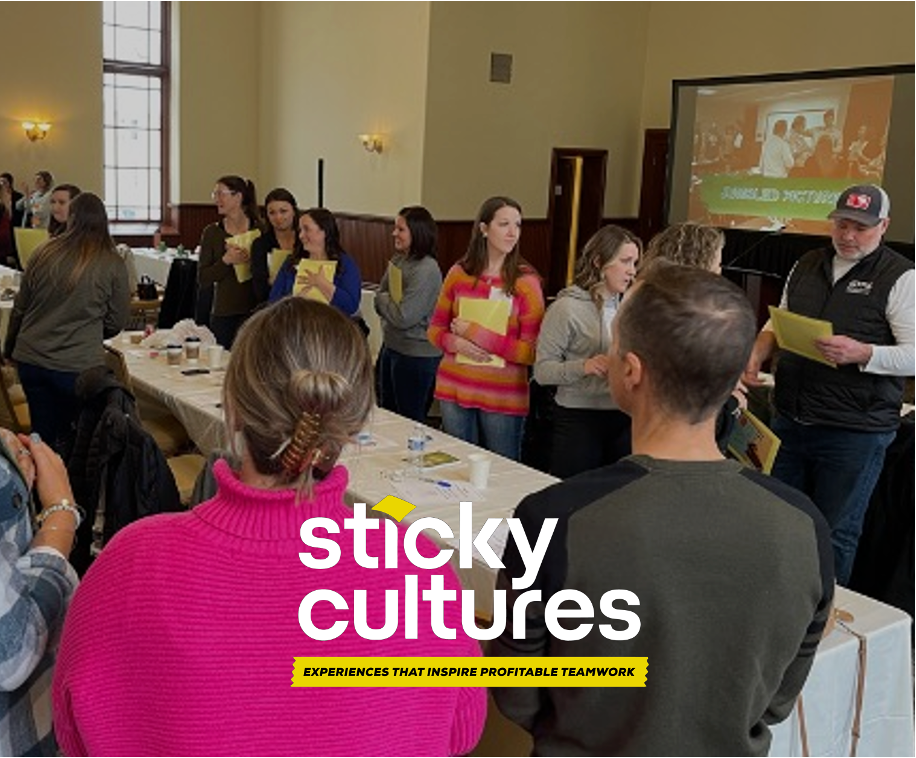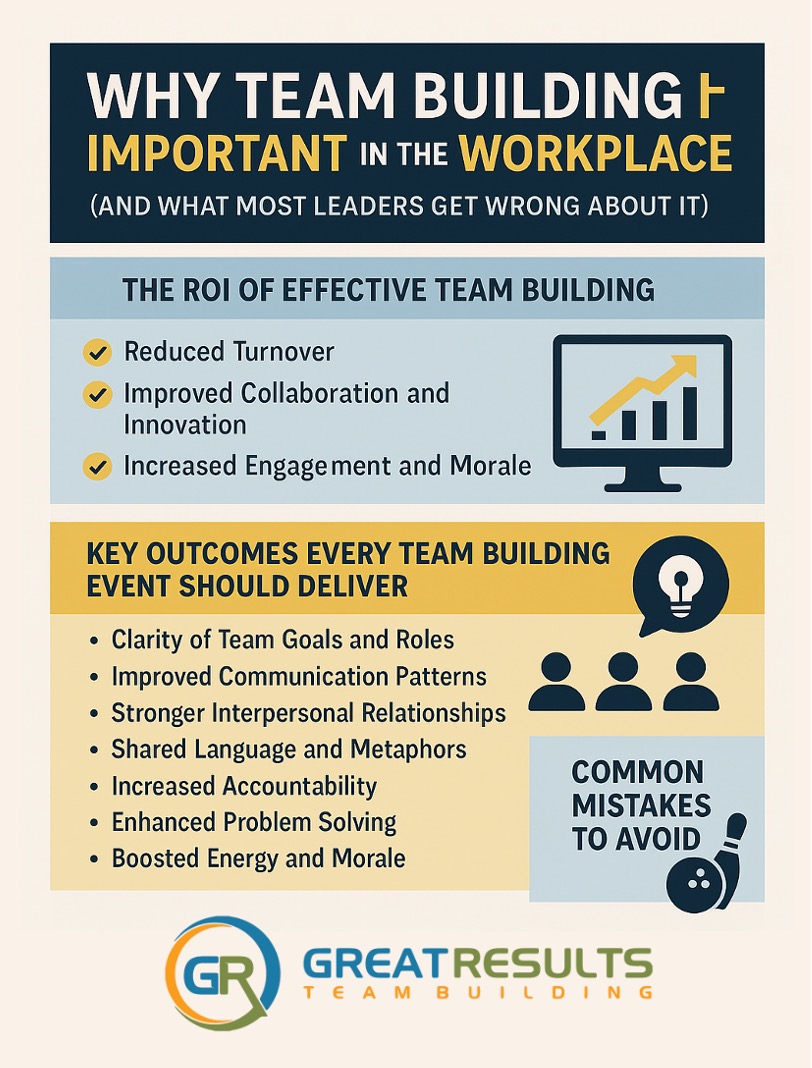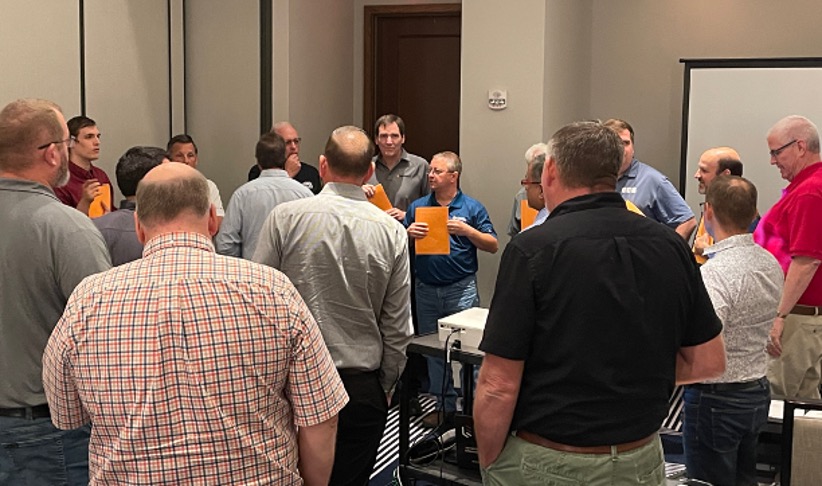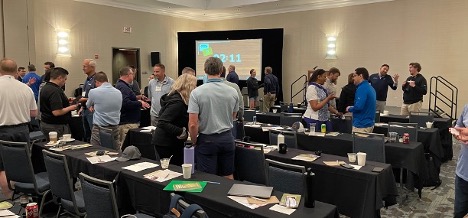If you’re a manager, business owner, or organizational leader, you’ve likely wrestled with how to improve morale, boost collaboration, and retain top talent. You’ve also probably heard your fair share of jokes or rolled eyes when someone mentions “team building.”
Unfortunately, that’s because most people confuse team building with team entertainment.
A trip to Topgolf or bowling might be fun, but let’s be honest—if the goal is improved communication, accountability, and culture, that outing likely missed the mark. And this misunderstanding is exactly why so many leaders are disappointed when they don’t see lasting benefits from the team-building initiatives they invest in.
If you are wondering why team building is important in the workplace, this article explores the difference between recreational activites and intentional, facilitated team-building events,
Read on to discover the tangible benefits that a smart, strategic approach can deliver for your team and organization.
What Most Leaders Miss About Team Building
The phrase “team building” has been diluted in recent years. It’s become synonymous with ropes courses, escape rooms, and company picnics. While these are enjoyable diversions, they often lack the depth or design to drive real behavioral change.
As someone who’s facilitated thousands of team-building programs for clients like the CDC, Emory University, and John Deere, I can tell you that fun isn’t the problem.
The issue is intention—and the absence of facilitated reflection that transforms a shared experience into a shared lesson.
Team building goes far beyond camaraderie or an afternoon out of the office.
It’s about creating clarity, connection, and commitment across your team—and that requires more than entertainment. It requires strategy.
The True Reason Why Team Building is Important
Intentional team building—when designed and facilitated well—does three things that are vital for high-performing teams:
-
It Improves Communication
In many teams, poor communication isn’t due to a lack of effort—it’s due to a lack of understanding. Team members bring different personalities, styles, and assumptions to work every day. Facilitated team-building experiences reveal those differences in a safe, engaging way that helps people adapt and communicate more effectively.
When your people feel heard and understood, they’re more likely to contribute ideas, ask for help, and give feedback—essential habits for any thriving organization.
-
It Builds Trust and Empathy
Why team building is important in the workplace also has a lot to do with emotional intelligence. Trust isn’t just about reliability; it’s about relational safety. Facilitated activities—unlike casual social events—are designed to encourage vulnerability, recognition, and shared accomplishments, which are all foundational to deeper trust.
Leaders often underestimate the power of creating small, structured opportunities for empathy. Great team-building experiences do just that, increasing psychological safety and reducing unhealthy conflict.
-
It Reinforces a Culture of Accountability
High-performing teams don’t just get along—they hold each other accountable. Facilitated team-building experiences can introduce language, metaphors, or shared insights that teams refer back to for months or even years.
When people walk away from a session with meaningful takeaways—like the need to “row in the same direction” or “own their 20 square feet”—they adopt shared language that drives alignment and accountability well beyond the event itself.
The ROI of Intentional Effective Team Building
You wouldn’t spend thousands on software without measuring its impact. So why spend money on team-building activities that don’t drive real outcomes?
When done right, team building isn’t a cost—it’s an investment.
And like any smart investment, it should deliver a return. Here’s what intentional, facilitated team-building can offer your organization:
✅ Reduced Turnover
Employees don’t leave companies—they leave cultures. And culture is shaped by how connected, supported, and valued people feel. Team building helps foster those feelings by reinforcing relationships and appreciation across your team.
✅ Improved Collaboration and Innovation
When silos come down and relationships are strengthened, collaboration thrives. People share information more freely, offer support more willingly, and solve problems more creatively—because they’re no longer just coworkers; they’re teammates.
✅ Increased Engagement and Morale
According to Gallup, highly engaged teams show 21% greater profitability. But engagement doesn’t happen by accident. It comes from leaders who recognize why team building is important and invest in the emotional and relational climate of their teams.
Why Facilitated and Intentional > Recreational
Let’s get specific.
There are two basic types of team-building activities:
-
RECREATIONAL ACTIVITIES
Examples: Axe throwing, bowling, escape rooms, top golf, night
Outcomes: temporary fun, forgettable events, limited team impact
-
INTENTIONAL FACILITATED ACTIVITIES
Examples: Customized experiential challenges based on your situation
Outcomes: reflection, connection, awareness, trust, accountability
The difference lies in structure and purpose.
As a team-building speaker and facilitator, I design sessions that are customized to reveal and reinforce specific behaviors. We don’t just play games—we debrief what happened, what it revealed about the team, and how those lessons apply in the real world.
That’s what makes the experience something that truly help to create a sticky culture.
When you pair activity with insight, you don’t just get laughs. You get lasting impact.
Why Team Building Is Important for Remote Teams
If your team operates in a remote or hybrid environment, the stakes are even higher. Disconnection is a common pain point, and spontaneous hallway conversations are a thing of the past.
Intentional, facilitated team-building can be the bridge.
Virtual sessions—when designed well—can create real connection and combat isolation. Even better, when your remote team gathers in person every 4–6 months, a facilitated team-building session can multiply the value of that time together, helping restore camaraderie, reinforce expectations, and rekindle momentum.
These aren’t just “nice-to-haves.”
They’re mission-critical for distributed teams.

Outcomes Every Team Building Event Should Deliver
If you’re planning a team-building initiative, here are the seven essential outcomes you should aim for—outcomes that highlight exactly why team building is important when done right:
- Clarity of Team Goals and Roles – Alignment reduces confusion and increases effectiveness.
- Improved Communication Patterns – Teams speak with more honesty, respect, and efficiency.
- Stronger Interpersonal Relationships – Trust and empathy create a more positive culture.
- Shared Language and Metaphors – Teams recall and reuse the insights gained.
- Increased Accountability – People take more ownership for their behavior and results.
- Enhanced Problem Solving – Challenges are faced collaboratively, not individually.
- Boosted Energy and Morale – Recharged teams bring renewed enthusiasm to their work.
If your team-building plans aren’t targeting those outcomes, you’re not getting the full benefit of your investment.
Common Mistakes to Avoid
Even well-intentioned leaders can waste time and money on team building that doesn’t move the needle. Here are three common pitfalls:
❌ Mistaking Socializing for Team Building
While happy hours and office games can improve familiarity, they rarely change behavior. If you’re not guiding people through a process of shared discovery, you’re missing the deeper impact.
❌ Ignoring Objective Facilitation
A well-facilitated session ensures that the experience connects directly to the workplace. Without a skilled guide to frame the activity, the “a-ha” moments never emerge.
❌ Treating It as a One-Time Event
The best team-building efforts are part of a long-term strategy. One great session can spark change, but sustained growth comes from reinforcing those insights in meetings, coaching, and culture.
How to Choose the Right Team Building Experience
To ensure you choose a team-building experience that delivers value, ask these three questions:
- What are the specific outcomes we want from this experience?
- Will the event include guided reflection to connect the activity to our team’s real challenges?
- Does the facilitator have a track record of transforming behaviors, not just entertaining?
When the answer is “yes” to all three, you’ve found more than just a morale booster—
You’ve found a catalyst for team growth.
Why Team Building Is Important in the Workplace
In today’s world of rapid change, remote work, and rising stress levels, teams are under pressure like never before. Burnout is real. Disengagement is costly. And talent is mobile…
If you want more information about how to imporve your team performance and retention, I even wrote a book about What Effective Leaders DO.
But the solution isn’t another tool or policy memo. It’s a renewed investment in the human side of work.
People crave connection.
They want to feel seen, supported, and part of something bigger than themselves. Facilitated team-building experiences do more than bring people together – they build the trust and alignment that make great work possible.
If you want your people to be more engaged, more collaborative, and more committed, now is the time to take team building events more seriously.

A Final Thought (and Your Next Steps)
Too often, leaders ask “What will this cost?”
The better question is, “What will it cost us if we don’t?”
Disengaged teams underperform. Miscommunication leads to mistakes. And high turnover drains time, money, and morale.
But it doesn’t have to be that way.
Because asking yourself why team building is important is just the beginning.
The REAL value is in the changed awareness, attitudes and actions that you see after the event…
If you’re ready to move beyond surface-level activities and invest in an experience that truly transforms your team, I invite you to reach out to discuss what a customized fun and interactive program might look like for your team.
As a team-building facilitator and leadership coach, I’ve helped organizations across industries create stronger, more connected, and more profitable cultures through intentional, customized sessions that stick.
And I’d love to help your team do the same.
– – – – –
Sean Glaze is a sought-after leadership and workplace culture speaker, who gained valuable insights on turning talent into teamwork as a successful basketball coach – and now he travels around the country to share those actionable lessons.
talent into teamwork as a successful basketball coach – and now he travels around the country to share those actionable lessons.
Sean’s engaging conference leadership keynotes and custom team building programs have helped clients like Cisco, John Deere, the CDC, and Emory University to increase collaboration, boost productivity, and build Sticky Cultures that inspire more profitable teamwork.
Sean’s books, Rapid Teamwork, What Effective Leaders DO, The 10 Commandments of Winning Teammates, and Staying Coachable are entertaining parables that accelerate the growth of leaders and teams!



